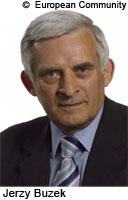European Parliament adopts report on FP7
The European Parliament has adopted the report outlining the Seventh Framework Programme (FP7) by an overwhelming majority. This endorses the structure of FP7. The report now gives broad support to the European Commission's proposed work programme, which will have a budget of EUR 50,521 billion. The Parliament also adopted, by a large majority, the report on the proposed European Atomic Energy Community's seventh Framework Programme (EURATOM). Although EUR 50,521 billion is lower than both the Commission and many MEPs wanted, it is substantially higher than the EUR 16 billion budget of the current Framework Programme. MEPs were happy with the nine thematic areas outlined by the Commission, but voted to split the 'security and space' theme into two separate headings. They also stipulated that two thirds of the Energy budget should go towards research into renewable energy activities, energy efficiency and savings, and made some other adjustments to the allocation of funds among the different parts of the programme. The votes on amendments referring to stem cell research were extremely close. In the end, the MEPs voted by a majority of just 25 votes to follow the line suggested by the Parliament Committee on Industry, Research and Energy (ITRE), i.e. research on the use of both adult and embryonic human stem cells may be funded by FP7, subject to national laws and strict licensing rules. Italian MEP Marco Cappato, who is strongly in favour of stem cell research, described the vote as 'a success for a secular and tolerant Europe.' The result will be a disappointment to pro-life groups which have argued strongly against funding stem cell research. The Parliament was enthusiastic about the creation of the European Research Council (ERC), but wanted to be sure it would enjoy real autonomy. They suggest it should be set up as an Executive Agency, before becoming an independent structure, after a brief transition phase. The Parliament asked the Commission to present a proposal to both the Parliament and Council, to 'implement the ERC as a permanent, legally independent structure.' An independent review of the ERC, will be held in 2008, when its structures and mechanisms may be modified. 'The programme is designed to respond to the competitiveness and employment needs of the EU,' said Jerzy Buzek, the Polish MEP who drafted both the reports presented to the European Parliament. 'It is my hope that the speed at which we have worked on the Seventh Framework Programme will be sustained. The European community of scientists and industry is looking forward to the successful start of the programme. All of us in the EU are waiting for the success of the Lisbon Strategy.' In a statement, the European Commission welcomed the vote, commenting that it remained largely in line with the original Commission proposal. The document will now be debated by Member States, before a second reading in the Parliament later this year. The spokesperson for European research Commissioner, Janez Potocnik, welcomed the vote, saying it went very much in favour of the Commission's original proposal.



